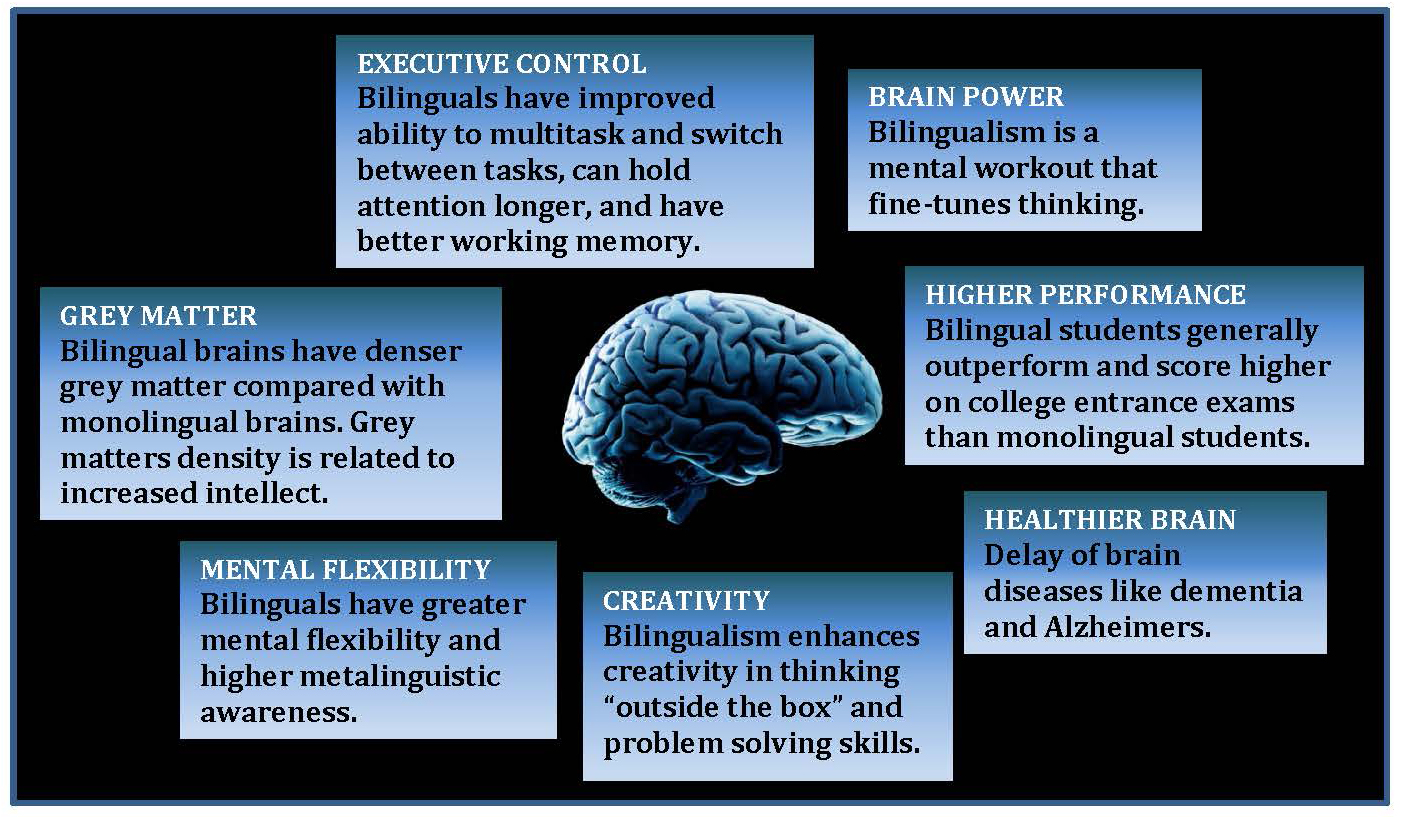
Many people acknowledge that knowing two languages is a good thing: you are more likely to get a good job, you can establish cross-cultural connections, and it makes traveling easier and more accessible. What people are less aware of is how bilingualism actually enhances your brain. Bilingualism allows our brain to be more efficient, better developed, and even resistant to disease and aging.
Focus
Contrary to the myth that two languages can confuse a child’s brain, evidence from research shows that attending to multiple languages helps sharpen attention, memory, and processing. Look at the picture below. For a bilingual person, this object can be called apple, but in different contexts it can also be manzana, pomme, sakwa, or bilasáana. The speaker now has a conflict to resolve: which word do I choose? Activating one word while inhibiting the other is a difficult task, but as a result it strengthens and sharpens the processes in the brain.

As you can imagine, doing this constantly every time you communicate strengthens these processes immensely. Indeed, research shows that in comparison to the monolingual brain, the bilingual brain is able to deal with interference more efficiently. In other words, bilinguals can better put aside interfering information and attend to the task at hand. This is helpful for learning and memory because bilinguals are better at selectively ignoring distractions while focusing on the target information.
In a recent study, bilingual and monolingual adults were given colored pictures of animals, and they were told to either name (a) the animal or (b) the color, depending on the cue. For example, participants would see a blue cow and would have to answer “cow” or “blue” depending on which question was given. Overall, the bilinguals performed better because they were good at resolving interference. Putting it simply, they could inhibit the word “cow” and respond with “blue”, and not so easily get fooled when the question switched back and forth.
Multitasking and Task Switching
Like in the apple example, bilinguals have to juggle two languages and know when to use each one. Because each language has its own unique grammar, sounds, and meanings, bilinguals get a lot of practice at switching between languages. On top of that, there are pragmatic factors to think about, like whether the person one is speaking with is monolingual or bilingual, whether the context calls for the use of one language or the other, and whether there are variations in status of each language.
From having to negotiate these complex decisions day after day, bilinguals become experts at multitasking and switching between tasks. Researchers Anat Prior and Brian MacWhinney had bilingual and monolingual college students perform shape and color matching tasks at the same time, one with the left hand and one with the right hand. They found that bilingual students significantly outperformed their monolingual counterparts. Not only could bilinguals multitask more easily, they could also switch back and forth between two different tasks fluidly. The consequence of this? Bilinguals can perform more tasks in less time, make faster decisions, and juggle more complex tasks.
Grey Matter
Can being bilingual literally change the makeup of your brain? Research points to yes. Studies show that bilinguals actually have denser grey matter in the executive control region of the brain. Grey matter helps with higher-order functions:
- Memory
- Processing information
- Decision-making
- Self-control
- Spatial reasoning
These skills are not only helpful in daily life, but in school and in the workplace as well. Scientists point out that bilinguals have denser grey matter because of the constant need for cognitive control. By learning and balancing two sets of grammar rules, sounds, vocabularies, and even social norms of usage, the part of the brain that regulates higher-order functions get stronger and denser. Some people play daily memory games on their devices or take supplements and pills to boost their brain; what might actually help more is learning a second language!
Healthier Brain
Not only does bilingualism make your brain denser; it actually protects the brain from cognitive disease like dementia and Alzheimer’s. Researchers call it “neuroprotective” effects, where bilingualism can slow the decline of brain functions. Ellen Bialystok, professor of psychology at York University, found that bilinguals are able to delay the symptoms of Alzheimer’s disease for 5.1 years longer than monolinguals. And bilinguals are typically diagnosed with Alzheimer’s 4.3 years later than monolinguals. Essentially, the bilingual brain is able to fight the debilitating effects of the disease for longer. From all the practice the bilingual brain has had in multitasking, solving conflicts, and selectively inhibiting, it builds powerful resistance against cognitive disease. This is akin to a constant mental workout for bilinguals.
The good news is, you don’t have to be a “balanced bilingual” or a bilingual from birth in order to reap the benefits. Bialystok suggests that even if you’re not fluent, working the brain through the rigorous process that is language learning will help strengthen the brain. Even people who learned language later in life—in their 50s or 60s—see these protective benefits.
 Courtesy of Sonia Soltero
Courtesy of Sonia Soltero
Bilingualism is an Advantage
Bilinguals are not all the same. Some are born as simultaneous bilinguals–they grew up with both languages from birth. Some are sequential bilinguals–they learned the second language after acquiring their first language. Some must learn the second language because of immigration or relocation, while other choose to become bilingual through foreign language classes or travel. Schools and teachers often play a very important role in developing not only bilingualism but also biliteracy–the ability to read and write well in two languages. The Illinois State Seal of Biliteracy was passed into law in 2013 and points to the increasing recognition that bilingualism is an asset that has many cognitive as well as economic and academic benefits. Through Bilingual Education and World Language Education we can help students to become bilingual and biliterate and reap the cognitive advantages of bilingualism!
Sunny Park-Johnson is an Assistant Professor of Bilingual-Bicultural Education and director of the Bilingual Education/ESL minor at the College of Education at DePaul University. Her research interests include bilingual and second language acquisition, code-mixing, and heritage language maintenance. At DePaul, she teaches courses on acquisition, sociolinguistics, and language assessment.
Interested in sharing the benefits of bilingualism? DePaul's College of Education offers both an undergraduate minor in English as a Second Language/Bilingual Education and an MA/MEd in Bilingual-Bicultural Education. These programs are designed to develop culturally responsive teachers who nurture students' ability to speak more than one language.